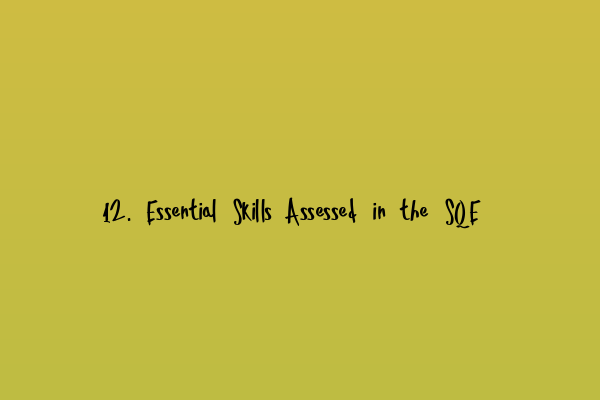12. Essential Skills Assessed in the SQE
The Solicitors Qualifying Examination (SQE) is a comprehensive assessment that all aspiring solicitors in England and Wales must pass in order to qualify. It is designed to test your knowledge, skills, and competence in various areas of law. In this article, we will explore the essential skills assessed in the SQE and discuss why they are crucial for your legal career.
SQE webinars provide expert insights and tips to help you excel in your study and preparation for the examination. Don’t miss out on this valuable resource!
1. Legal Research
One of the fundamental skills assessed in the SQE is legal research. As a solicitor, you will often need to conduct thorough research to find relevant laws, statutes, cases, and legal precedents to support your arguments and provide accurate advice to your clients. Strong research skills are crucial for success in legal practice.
2. Legal Writing
Effective written communication is vital for solicitors. The SQE assesses your legal writing skills, including your ability to draft legal documents, such as contracts, pleadings, and legal opinions. Clear and concise writing is essential to convey complex legal concepts to clients and colleagues.
Need help choosing the best SQE course provider? Read our review of SQE course providers to find the best fit for you.
3. Client Interviewing
Building strong client relationships is a key aspect of being a solicitor. The SQE examines your ability to conduct effective client interviews to gather relevant information, understand their needs, and provide appropriate legal advice. Good communication, active listening, and empathy are essential skills for successful client interactions.
4. Advocacy
Advocacy skills are tested in the SQE to assess your ability to represent clients in court or other formal legal settings. This includes your oral presentation skills, ability to construct persuasive arguments, cross-examination techniques, and knowledge of court procedures.
Want to know more about the SRA syllabus for the SQE? Check out our article on unveiling the SRA syllabus for the SQE.
5. Case and Matter Analysis
The SQE evaluates your analytical skills by presenting you with complex legal scenarios and asking you to identify the relevant legal issues, analyze the facts, and provide appropriate legal solutions. This skill is crucial for solicitors to effectively advise their clients and handle legal matters efficiently.
6. Problem-Solving
Problem-solving is a vital skill for solicitors. The SQE assesses your ability to identify and analyze legal problems, consider alternative solutions, and apply legal principles to arrive at the best course of action. This skill is essential for addressing the challenges and complexities that arise in legal practice.
7. Legal Ethics and Professional Conduct
As a solicitor, you must adhere to high ethical standards and maintain professional conduct. The SQE tests your knowledge and understanding of the Solicitors Regulation Authority (SRA) Code of Conduct, legal ethics, and professional responsibility. Upholding these principles is crucial to maintaining public trust in the legal profession.
If you’re looking for insider tips and study tricks to conquer the SQE, be sure to read our article on SQE success.
8. Drafting and Advising
Drafting legal documents and providing accurate advice to clients are essential skills assessed in the SQE. You will be tested on your ability to prepare legal documents, such as contracts, wills, and letters, ensuring they are accurate, legally sound, and tailored to the needs of your clients.
9. Time Management
The ability to manage your time effectively is crucial for solicitors who often juggle multiple cases and deadlines. The SQE assesses your time management skills by presenting you with simulated legal scenarios and evaluating your ability to prioritize tasks, meet deadlines, and handle time-sensitive matters efficiently.
10. Negotiation
Negotiation skills are tested in the SQE to assess your ability to resolve legal disputes through constructive dialogue and compromise. As a solicitor, you will often negotiate settlements, contracts, and agreements on behalf of your clients. Strong negotiation skills can help achieve favorable outcomes for your clients.
11. Business and Financial Awareness
Solicitors need to have a good understanding of business and financial concepts to provide comprehensive advice to their clients. The SQE assesses your knowledge of business structures, financial statements, and basic accounting principles to ensure you can effectively advise clients on commercial matters.
12. Professional Judgment
Professional judgment is a critical skill for solicitors, as they often have to make decisions based on complex legal and ethical considerations. The SQE tests your ability to assess legal situations, weigh different factors, and make informed decisions that align with the best interests of your clients.
Understanding the grading system in the SQE is essential to gauge your performance. Learn more about it in our article on the grading system in SQE.
Overall, the SQE assesses a wide range of essential skills that are crucial for success as a solicitor. By understanding and developing these skills, you can enhance your chances of qualifying and thrive in your legal career.
